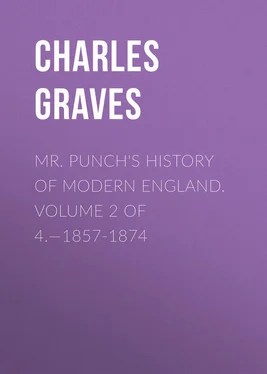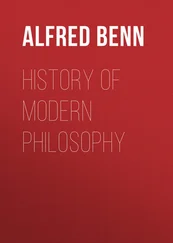Charles Graves - Mr. Punch's History of Modern England. Volume 2 of 4.—1857-1874
Здесь есть возможность читать онлайн «Charles Graves - Mr. Punch's History of Modern England. Volume 2 of 4.—1857-1874» — ознакомительный отрывок электронной книги совершенно бесплатно, а после прочтения отрывка купить полную версию. В некоторых случаях можно слушать аудио, скачать через торрент в формате fb2 и присутствует краткое содержание. ISBN: , Издательство: Иностранный паблик, Жанр: foreign_prose, foreign_humor, на английском языке. Описание произведения, (предисловие) а так же отзывы посетителей доступны на портале библиотеки ЛибКат.
- Название:Mr. Punch's History of Modern England. Volume 2 of 4.—1857-1874
- Автор:
- Издательство:Иностранный паблик
- Жанр:
- Год:неизвестен
- ISBN:http://www.gutenberg.org/ebooks/45003
- Рейтинг книги:4 / 5. Голосов: 1
-
Избранное:Добавить в избранное
- Отзывы:
-
Ваша оценка:
- 80
- 1
- 2
- 3
- 4
- 5
Mr. Punch's History of Modern England. Volume 2 of 4.—1857-1874: краткое содержание, описание и аннотация
Предлагаем к чтению аннотацию, описание, краткое содержание или предисловие (зависит от того, что написал сам автор книги «Mr. Punch's History of Modern England. Volume 2 of 4.—1857-1874»). Если вы не нашли необходимую информацию о книге — напишите в комментариях, мы постараемся отыскать её.
Mr. Punch's History of Modern England. Volume 2 of 4.—1857-1874 — читать онлайн ознакомительный отрывок
Ниже представлен текст книги, разбитый по страницам. Система сохранения места последней прочитанной страницы, позволяет с удобством читать онлайн бесплатно книгу «Mr. Punch's History of Modern England. Volume 2 of 4.—1857-1874», без необходимости каждый раз заново искать на чём Вы остановились. Поставьте закладку, и сможете в любой момент перейти на страницу, на которой закончили чтение.
Интервал:
Закладка:
Here the verses drive home the argumentum ad pocketum in the crudest way. Cousin Jonathan is told not to be an ass, or "bid Mrs. Britannia stop ruling the wave": —
We'll break your blockade, Cousin Jonathan, yet,
Yes, darn our old stockings, C. J., but we will.
And the cotton we'll have, and to work we will set
Every Lancashire hand, every Manchester mill.
We're recruiting to do it – we'll make no mistakes:
There's a place they call India just over the way;
There we're raising a force which, Jerusalem, snakes!
Will clean catawampus your cruisers, C. J.
"Distressed Millionaires"
Events entirely failed to justify these truculent words. A year later the cotton famine was at its height, and an appeal for funds is headed "Welly Clamming," with the explanation, "Everywhere we hear this, the Lancashire Doric for 'nearly starving.'" Punch applauds the zeal of the Quakers in relieving the distress caused by famine, fever and frost, and simultaneously reproduces this extraordinary advertisement from the Manchester Guardian : —
Travel : A gentleman, whose son, aged 17, is thrown out of occupation by the Cotton Famine, would be glad to meet with one or two other young gentlemen to accompany his son on a Tour, for five or six months, in the Mediterranean or elsewhere.
Address F. 127 at the Printers.
The advertiser, according to Punch , appears to be "one of those distressed millionaires who, because their mills have ceased working, declare themselves destitute mill-owners, and devolve on the squires and farmers and the British public the duty of rescuing their unemployed workpeople from starvation."
When a ship was sent to Liverpool bearing the contributions of the United States to the relief of Lancashire in February, 1863, Punch welcomed the gift without reserve, as linking the two worlds anew by the chain of fraternal goodwill. But a very different spirit is shown in his acid comments on the debate in the House of Commons initiated by W. E. Forster, who attacked the Government for not interfering to prevent ships of war being supplied by our builders to the Confederates, and said that we incurred great danger of war. The facts and the sequel fully justified Forster's protest, but Punch was not content with backing up Palmerston's defence of the Government, and treated with contempt and ridicule Bright's insistence on the sympathy of the working classes with the North: —
Here it may be mentioned that Mr. Bright 3 3 The variations of view in Punch's estimate of John Bright form an interesting study. In the main, while admiring his courage, Punch found him too fond of asserting an impracticable independence. The masses distrusted him as a cottonocrat; the middle-classes as an out-and-out democrat and therefore an advocate of mob-rule. Punch himself had described Bright as an inciter to class-hatred in 1860.
alluded in his speech to a meeting held the day before at the St. James's Hall, where he had been in the chair, and a crowded assembly of workmen testified the utmost sympathy with the North. This meeting is grandiloquently described by the Yankee organ here, but shall describe itself for Mr. Punch's readers. It was chiefly composed of Trade Union men, and when a person who had chosen to be free and act for himself ventured to speak, although on the same side as the other orators, these lovers of liberty interrupted him with cries of "He's not a Society man!" Mr. Bright made a fervid and eloquent speech in favour of the North, and a shoemaker came next, who abused Mr. Punch , said "that a monster in human shape had been guest of the Lord Mayor," and that "the Devil, in the shape of The Times newspaper, was carrying out an infernal purpose." A joiner then called Lord Palmerston a liar, and a Professor Beestley, or some such name, attacked the "wicked press," meaning the respectable journals. An address to Mr. Lincoln was agreed to, assailing the "infamous Times ," the "arrogant aristocracy," the "diabolical" South, our "unscrupulous moneyocracy," and the "infamous rebellion," and terminating with some gushing bosh about the vivifying Sun of Liberty. This document is penned in New York Herald style, and probably owes its origin to Yankee inspiration. To this kind of meeting, and this kind of language, Mr. Bright referred, complacently, in the House of Commons. The North must be in a bad way when such allies are coveted.
Libelling Lincoln
The South was in a much worse way when a "respectable journal" was reduced to explaining away the undoubted and disinterested support of the North by Lancashire cotton spinners and other British working men as Trade Union tyranny, to say nothing of that worst infirmity of political controversy – the vulgar perversion of an opponent's name. Punch was on stronger ground in criticizing the spread-eagling of the northern Press, as when the New York Herald declared that: —
They (the American people) know that when this rebellion began the aristocrats of England took advantage of the chance to destroy us, and joined heart and hand with the slaveholding rebels. They know that this rebellion was born in Exeter Hall, nurtured by the English aristocracy, armed from English arsenals, and supported by English sympathy and assistance.
Punch , though no lover of Exeter Hall, could not refrain from ironically vindicating its innocence, and makes for the rest some good debating points against the Herald . But there is little "neutrality" in his statement that Southern loyalty was as staunch as that of the North, "though not so truculent or atrocious"; and when he falls foul of the Yankees – a word invariably used in a disparaging sense – for calling the confederates "rebels," he did not know that the magnanimous Lincoln would never allow them to be called by that name in his presence. He is made to do so, however, in Punch's parody of one of Lincoln's speeches – a truly lamentable performance, in which the President claims dictatorial powers, calls for whipcord to whip the rebels, abuses the "rotten old world," talks with the utmost cynicism of the blacks, and in general behaves like a vulgar buffoon. The true Lincoln is to be found in the immortal Second Inaugural delivered on March 4, 1865.
As for the British working men, though Punch had undoubtedly endeavoured to discount the strength of the tide of feeling which continued to run strongly against the slave power, in spite of the terrible suffering brought about by the blockade, he quoted with approval Lord Palmerston's formidable and damaging indictment of the manufacturers in the House of Commons on July 30: —
"We know," he said, "that in the county most fortunes have been made by the manufacturers. I do not agree with the Hon. Member for Stockport that it has all been invested in the mills. On the contrary they have accumulated much more than their mills could have cost. There are enormous capitalists in the county, some of whom, I am sorry to say, though they have starving populations at their gates, and anticipate worse distress as coming, have actually, for the sake of profit, sold and sent out of the country the cotton which they ought to have used for the employment of the people. I say, why are these people to be exempt, and not to be made to contribute to the distress which they see around them?"
This speech, Punch observes, enraged Cobden, who was furious with Palmerston for his unjust, reckless and incorrect charge; but his reply was inconclusive, as he could only say that a large proportion of Lancashire mill-owners had not sold their stocks of unsold cotton to foreigners for the sake of the high prices which the fibre commanded. Cobden returned to the charge a couple of days later in a speech which is a most extraordinary prospective plagiarism of the election address of any anti-waste Independent Liberal candidate in the year 1921, as may be judged from Punch's summary: —
Читать дальшеИнтервал:
Закладка:
Похожие книги на «Mr. Punch's History of Modern England. Volume 2 of 4.—1857-1874»
Представляем Вашему вниманию похожие книги на «Mr. Punch's History of Modern England. Volume 2 of 4.—1857-1874» списком для выбора. Мы отобрали схожую по названию и смыслу литературу в надежде предоставить читателям больше вариантов отыскать новые, интересные, ещё непрочитанные произведения.
Обсуждение, отзывы о книге «Mr. Punch's History of Modern England. Volume 2 of 4.—1857-1874» и просто собственные мнения читателей. Оставьте ваши комментарии, напишите, что Вы думаете о произведении, его смысле или главных героях. Укажите что конкретно понравилось, а что нет, и почему Вы так считаете.












